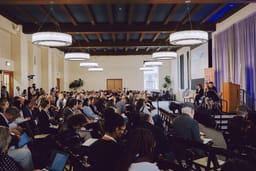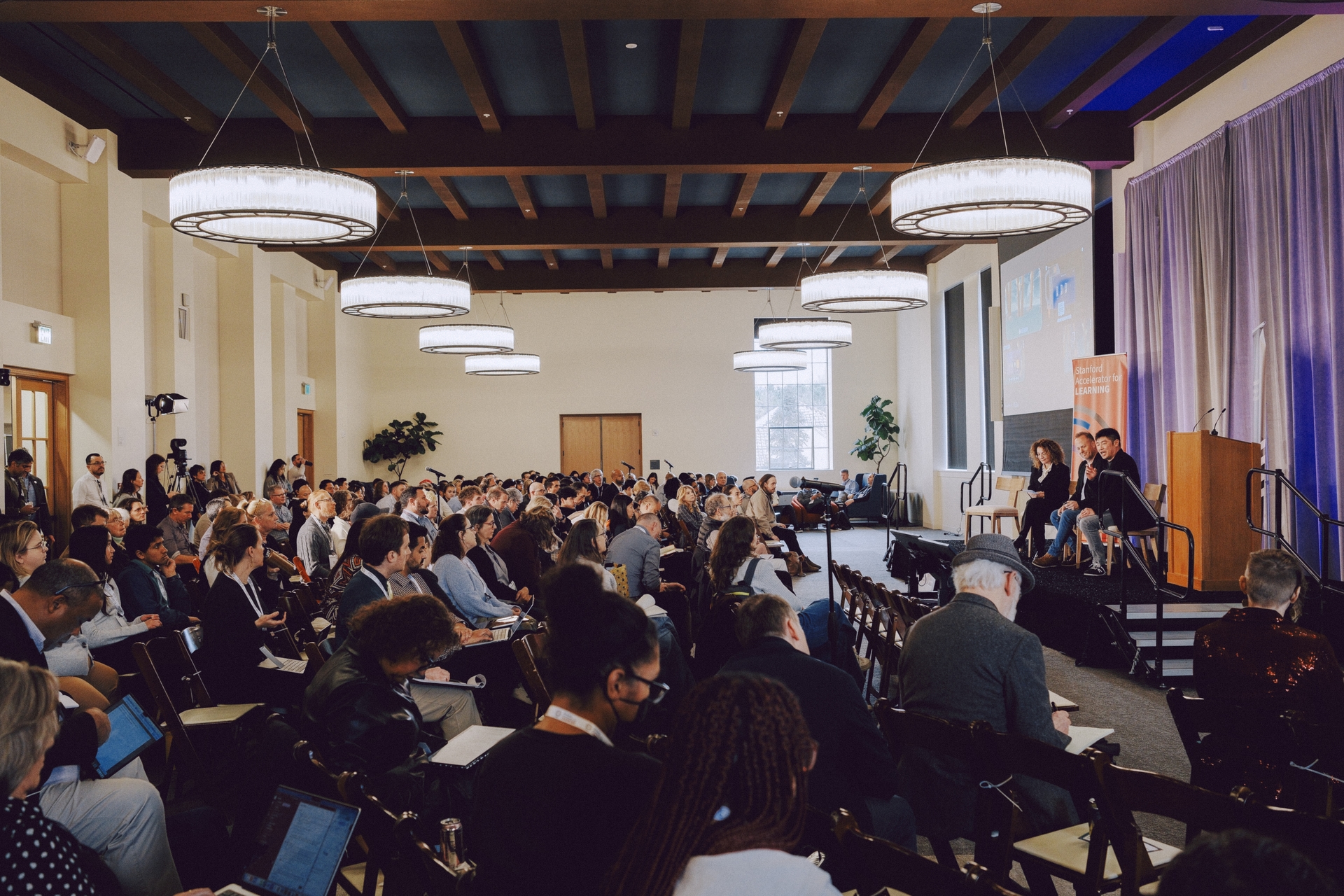The 12 Most-Watched Videos of 2022

Listen in to conversations on the metaverse, foundation models, trustworthy AI, and Stanford’s AI legacy.
Stanford HAI seminars and conferences covered the latest news and ideas in artificial intelligence. Missed one? Here are our most popular of the year, covering everything from virtual reality to spycraft to robotic manipulation. You can also follow us on YouTube to never miss a conversation.
Jeremy Bailenson: Your Mind on the Metaverse
In this HAI seminar, the founding director of Stanford University’s Virtual Human Interaction Lab described the psychology of virtual reality and how the medium will transform the way companies and schools teach, train, and operate; build culture; and communicate in an environment that offers countless opportunities for experimentation and innovation.
Looking Forward: AI in 2022
What were Stanford professors most excited about in the coming year for AI? We asked economist and Stanford Digital Economy Lab Director Erik Brynjolfsson, roboticist Chelsea Finn, bioengineering expert Russ Altman, and economist and political economy expert Laura Blattner to discuss where they expected the most change in 2022.
HAI Spring Conference 2022: Foundation Models
This was a major year for foundation models – powerful AI systems trained on massive amounts of data that can be used for a wide range of tasks. And that meant our spring conference session on foundation models was one of our most popular conversations of the year. In this conversation, Center for Research on Foundation Models Director Percy Liang, Stanford fellow Sarah Bana, Google research scientist Cordelia Schmid, OpenAI co-founder Ilya Sutskever, and Stanford ethicist Rob Reich discuss their potential, as well as their very real shortcomings and dangers.
Stanford’s AI Legacy
Stanford was one of the pioneers in artificial intelligence. In this video, professors including Chris Manning and Fei-Fei Li share highlights from the earliest days of natural language processing and computer vision, the work of scholars John McCarthy and Jay McClelland, the launch of the Stanford AI Lab, early robotics at the school, and other pivotal moments in Stanford AI.
Jack Clark Presenting the 2022 AI Index Report
In this HAI seminar, AI Index Steering Committee Co-Chair Jack Clark walked us through the 2022 AI Index report, an annual deep dive into the state of artificial intelligence in industry, education, government, and nonprofits. The report tracks everything from investment in AI to job posts, ethics papers, technological advances, and diversity. In this talk, Clark went over the report’s highlights, offered some high-level analysis, and took audience questions.
Amy Zegart: Spies, Lies, and Algorithms
The digital age has made intelligence gathering vastly more difficult, explained Amy Zegart, senior fellow at the Freeman Spogli Institute for International Studies, in this seminar. Agencies once concentrated on foreign governments and terrorists, but today, they also must understand American tech giants and how malign actors can use our own inventions against us. The National Security Agency faces competition from Google, Facebook, Apple, and Amazon; and Twitter and Facebook have become disinformation highways. In explaining the role, operation, and limitations of intelligence organizations, Zegart offered an unsettling proposition: In the wireless 21st-century world, espionage, sabotage, and brainwashing are no longer the province of government agencies; nearly anyone with an internet connection can do it.
Jeff Ding: The Rise and Fall of Great Technologies and Powers
How have technological revolutions affected the rise and fall of great powers? What can history tell us about today’s China/U.S. race for leadership in AI? In this seminar, Jeffrey Ding, HAI-CISAC postdoctoral fellow, discussed his latest research on how new technologies develop in different ecosystems and how countries compete against each other.
Carlos Guestrin: How Can You Trust Machine Learning?
As AI systems make more decisions for us, and the underlying machine learning systems become increasingly complex, it is natural to ask: How can I trust machine learning? In this seminar, Stanford computer science professor Carlos Guestrin presented a framework anchored on three pillars – clarity, competence, and alignment – for driving increased trust in machine learning.
Jeannette Bohg: Vision, Touch & Sound for Robustness & Generalizability in Robotic Manipulation
Learning contact-rich robotic manipulation skills is a challenging problem due to the high-dimensionality of the state and action space as well as uncertainty from noisy sensors and inaccurate motor control. In this talk, Jeannette Bohg, assistant professor of computer science at Stanford, explained what representations of raw perceptual data enable a robot to better learn and perform these skills. Specifically for manipulation robots, the sense of touch is essential, yet it is non-trivial to manually design a robot controller that combines different sensing modalities that have very different characteristics.
Sabelo Sethu Mhlambi: Decolonizing AI
“Decolonizing AI” is a critique and an emerging movement both in the West and non-Western world among AI researchers, activists, and practitioners. Its proponents have identified parallels between historical colonialism and the colonial-like scale and extractive nature of AI-related technologies developed by big tech companies. Can a decolonial framing address broader socio-economic issues of power and agency within the creation and use of AI?
AI Tutors to Help Prepare Students for the 21st-Century Workforce
AI can never replace the important relationship between teachers and students. But could it provide valuable feedback to both students and teachers to help achieve learning goals? Christopher Piech, assistant professor of computer science at Stanford, explains how he and his colleagues hope to demonstrate a path to effective, inspiring education that is both accessible and scalable. This research is part of HAI’s Hoffman-Yee Research Grants program, which funds interdisciplinary teams with research focused on the human and societal impact of AI, augmenting human capabilities, and developing AI technologies inspired by human intelligence.
AI and the Economy: Keynote by Condoleezza Rice
At HAI’s AI and the Economy conference, keynote speaker Condoleezza Rice, director of the Hoover Institution, discussed the broader context of emerging technologies that are changing the way we live. Technology is neutral, she explained, and how it’s applied makes it good or bad for humankind. That means it’s key for responsible countries to harness this technology first. In this discussion, she describes how the U.S. is poised to be a leader in artificial intelligence.
Stanford HAI's mission is to advance AI research, education, policy, and practice to improve the human condition. Learn more.



